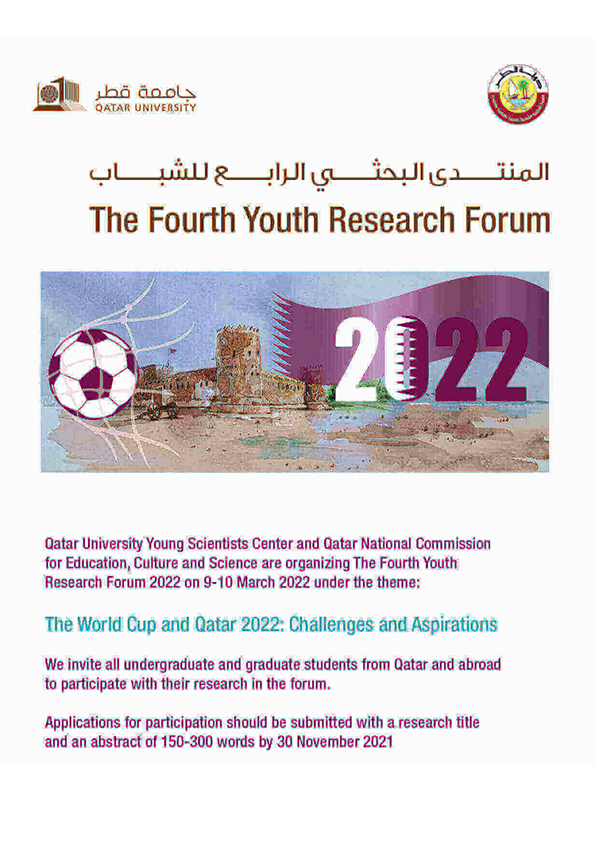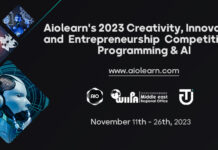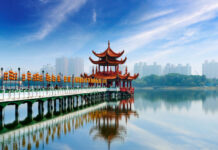Youth are the pillar of society as they are the ones to bear the burden of future generations’ sustainability. Soon enough, they are the ones to be positioned to have a tremendous capacity to give back to the community and to society in general, and to be the ones with the most potential to be dynamic physically, mentally, and creatively. In this way, young people are the most important resource that all social institutions (government, private, and NGOs) must invest in, in order to achieve integrated and sustainable development. These institutions should also study how young people transform their energies and creativity into positive productive elements that serve and develop society politically, culturally, socially, and economically. This forum seeks to develop in young people the culture of scientific research and to confirm their role in leading change and creating opportunities for development and progress through scientific research and innovation. This will be achieved through tying research to the needs of society and emphasizing the synergy of science and the integration of human knowledge and the importance of understanding the relationship between natural and technical sciences, humanities, social and cultural heritage, in order to increase the ability of societies to develop resources and sustain development opportunities.
As part of the University’s strategy aimed at developing scientific research among young people, particularly, the aspects related to identity studies, heritage, and cultural communication; the third research forum entitled “Identity and Cultural Tourism” plans to achieve several cognitive, cultural, and community purposes where the forum represents an opportunity for young people to serve the needs of society in the next crucial phases of development. This is especially the case, as the State of Qatar prepares to host the World Cup 2022, and young people will have a leading role in maximizing the benefit of this occasion by involving them in carrying out the research and exploratory duties leading up to this international event, such as highlighting the national identity and the culture of Qatar and its people, the introduction of its ancient heritage and its modern renaissance and the promotion of cultural tourism that can be enjoyed by the tourist and visitor to Qatar in the next stage.
Research Topics
FIRST: THE NATIONAL IDENTITY, SOCIAL AND CULTURAL HERITAGE AXIS
This theme addresses the challenges and aspirations of hosting the World Cup, which will bring together different cultural backgrounds of different nationalities in Qatar while preserving the cultural identity and social values of Qatari society.
Within this axis, researchers are invited to submit papers/posters related to the following topics:
- Understanding behaviors that may occur because of a lack of understanding of the “other” and its culture.
- Issues of social security and the safety of hosts. (Fans interact with their teams in different ways depending on their culture.)
- Choose cultural performances that reflect Qatar’s local and heritage cultural identity to mirror Qatar’s cultural aspects.
- Opinions of the Qatari people about hosting the World Cup.
- The history and culture of Qatar through the architectural designs of stadiums.
SECOND: LEGAL AXIS
Qatar’s organization of the 2022 World Cup poses many legal challenges, and there are many aspirations from this organization. In terms of legal challenges, we find the protection of intellectual property rights related to this important event, whether the intellectual property elements owned by FIFA or the companies associated with it.
Within this axis, researchers are invited to submit papers/posters related to the following topics:
- Intellectual property and the 2022 World Cup.
- Legislation related to workers and expatriates.
- Social legal aspects (public behavior and customs, and the impact thereof on Qatari society).
- Customs, duties, and taxes on goods brought by the participants to the event.
- The legal procedures that guarantee safety and public health, the non-spread of crimes, particularly cyber-crimes, and the non-spread of diseases among the participants.
- Organizing competition between national enterprises and companies and their foreign counterparts and ensuring that the former plays its national role within the framework of national laws and international conventions and treaties.
- Law and sports.
THIRD: SCIENCE, ENGINEERING, AND MEDICAL AXIS
How can basic sciences, engineering, and medicine facilitate the influx of masses to the State of Qatar and its stadiums, maintain their safety before, during, and after they attend matches, and preserve the environment in the State of Qatar?
Within this axis, researchers are invited to submit papers/posters related to the following topics:
- Mobile apps
- Robots
- Air Quality check and control
- Sustainability
- Sensors
- Food quality check and control
- Water quality check and control
- Public health protection and control
- Safe transportation
- Security
- Science and Engineering in Sports
- Athletes Medical Treatment
- Stadium constructions and designs
- Handling Emergency Situations
COMPETITION TERMS
- Ph.D., graduate, and undergraduate students can participate with their research in this forum.
- A student can submit his/her research individually, it is also allowed for a group of students (no more than 6 students) to submit one research topic.
- University Students can submit their research as a group of 2 – 6 students. Each group can have at least one undergraduate and one graduate student.
- Students from multiple disciplines can participate in a single research team.
- The student or group of students can apply to participate in the forum even if it is completed research or the research was presented in another scientific event provided that it comes within one of the themes of the forum.
- Researchers can submit only one research project. However, in one project, it may include interdisciplinary ideas.
- Projects can be either theoretical or practical.
- Completed or undergoing research can be submitted.
- Applications for participation will be submitted with the research title and an abstract of 150 – 300 words by November 30, 2021, with CVs including communication information.
- Researchers will be informed whether their research work abstract is accepted or rejected for inclusion in the research forum as oral or poster.
- A research report or poster will be submitted by January 31, 2022, to be evaluated by the research committee.
- Researchers shall submit their oral or poster presentations as a PowerPoint file.
RESEARCH EVALUATION CRITERIA
- The novelty and the alignment of the submitted topics with the advertised ones.
- The ability to identify research questions, aims, and their fundamental problems and explain the research methodology, ethical compliance, data collection tools, and the basis of the scientific experiment, if any.
- Discuss the results and come up with recommendations that answer the research questions.
- References must be added and should be arranged according to their appearance order in the document.
- The research paper should be around 3000 words. Each figure or table will be counted as 200 words.
- The font should be Times New Roman with size 12.
- The use of audiovisual media in the oral presentation (e.g., images and short videos) is highly encouraged.
- The poster size should be 150 x 120 cm.







